- Home
- Richard Kadrey
The Grand Dark Page 3
The Grand Dark Read online
Page 3
A second later, the flat’s door opened again. The man stuck out a grimy-black hand and grabbed for the box. “Give it to me.”
Largo took a step back out of his reach. He got the pad and pencil from his bag. “You have to sign for it,” he said.
The man’s hand dropped a few inches. “Please. I need it now.”
“Not until you sign.” Largo knew the rules of the Green. If he backed down now it would be a sign of weakness, and if anyone was watching the exchange it would put him in danger. He gave the man a hard look even as he felt a few beads of perspiration on his forehead.
“Wait,” said the scabby man. He closed the door for a moment and when he opened it again there was a pile of coins in his hand, including two small gold ones. “Take it.”
“Are you trying to bribe me?” he said, a little surprised by the offer.
There was another scream from the flat. Largo felt like a heel for continuing to play the game, but he knew he had to.
“It’s a tip,” said the man. “For your trouble and my earlier rudeness. Only you have to sign the form.”
Largo looked at the money. Whether it was a bribe or a tip, it was the largest amount of money anyone had ever offered him for a delivery.
There was another scream, this one more violent than the others. Largo grabbed the coins from the man’s hand and gave him the package. “Good luck,” he said, but the man had already slammed the door shut. Largo put the coins in his pocket and looked at the delivery form. There was no name on it, just the address.
Perfect. My first delivery as chief courier and I’ve already committed an offense that could get me fired.
With no other choice in the matter, Largo signed the form Franz Negovan, the name of a boy he’d known growing up in the Green. He was anxious and angry as he left the building, thinking that if all of his deliveries were like this, he wouldn’t last long as chief courier.
Downstairs, as he expected, the children who’d been playing war earlier were clustered around his bicycle. A dirty blond girl of about ten sat on the seat and looked at him with eyes that were forty years older and harder.
“We watched it for you,” she said. “Made sure nothing bad happened to it.”
Largo had been through similar shakedowns before and had known this other ritual of the Green was coming. When he’d been in similar situations as a child, when he’d had little to give or trade, the result was usually a beating or his running as fast as he could—and his bicycle being stolen or destroyed. These were only children, but in the Green, age didn’t mitigate danger. Fortunately, now things were different. He hoped.
He reached into his pants pocket and came up with some of the coins he’d brought from home and a few from the gray-haired man—all silver. He’d put the gold ones in his jacket. He said, “And you did an excellent job, I see. Here’s something for your trouble.”
The girl accepted the coins and counted them carefully. When she was done she nodded to the other kids and hopped off Largo’s bicycle. As soon as they were across the yard, the girl distributed the money to the other children and the war game resumed without missing a beat. Largo unchained his bicycle, dropped the lock into his shoulder bag, and pedaled slowly back down the route he’d taken earlier. As much as he wanted to speed away from the misery and memories of the Green, he kept to a moderate pace. To go faster was something else that he knew would show weakness. There were many unspoken but universally understood rules in the district, and he’d learned them all the hard way. The one odd thought that struck him as he pedaled away was that if, as a younger man, he hadn’t left Haxan Green, a hard-eyed little girl like the one at the tower block could have been his daughter. It made him think of his own family.
Largo had grown up with his parents in a decaying mansion by the canal. His father had a wagon and a sick horse that he’d probably bought under the table from an army stable. Father rode the wagon all over Lower Proszawa looking for scrap to sell and, like Largo, making the occasional delivery. Largo’s mother panhandled and picked pockets in the street markets around the Green. Largo had been a pale, scrawny child, and his parents had been very protective of him. Maybe too much, he thought now. He was always cautious and nervous around confrontations. Even his encounter with the scabby man, as well as he’d handled it, left him feeling slightly ill, which was humiliating.
Because no one had been home during the day to take care of him, Largo went with his father on his rounds. His mother worried about taking a small boy to some districts even more dangerous than Haxan Green—kidnappings were frequent and children were often sold off to fishing ships along the bay or pimps in the city. To protect the boy during his rounds, his father put him in a wooden crate up front in the wagon. It was through the air holes in the side of the crate that Largo first learned Lower Proszawa’s winding streets and alleys.
Later, he would become an expert while running from gangs wielding chains and knives or bullocks looking for his parents. Of course, he’d never admitted any of this to Remy. It was too embarassing. Besides, she talked as little about her family as Largo did about his, and it made him wonder if she had secrets too.
On his way back to the office, Largo was delayed by a caravan of double-decker party Autobuses. The city’s merrymakers always grew more boisterous in the days before the anniversary of the end of the Great War. Buses and street parties were some of the few places where the upper and lower classes mingled easily because each had the same goal—a gleeful obliteration.
When Largo returned to the courier office, Herr Branca was waiting for him.
“And how was your first foray into new territories?”
“Excellent. It went very well,” Largo said.
Branca glanced up from his paperwork. “I’m glad to hear that. König was seldom so cheerful when returning from Haxan Green.”
Largo smiled but wasn’t sure it was entirely convincing. “That’s too bad. As for me, I found the building, delivered the parcel, and made my way back without any problems.”
“Good. And there was no trouble with the client?”
Largo’s stomach fluttered for a moment as he thought of the forged receipt. “None, sir. Our meeting was both cordial and efficient.”
Branca chuckled. “Efficient. Again, something I’ve not heard about the Green before,” he said. Then he became more serious. “Tell me about the client. What was he like?”
The question took Largo by surprise. Herr Branca had never asked him about a client before, let alone one as peculiar as the gray-haired man. “He was just a man. An old man with gray hair and spectacles.”
“How did he appear to you?”
“Sir?”
“Was he in good health? Happy? Apprehensive? Was there anyone with him?”
Largo considered how best to answer the question. “He was surprised that I wasn’t König, but when I explained that he had moved on—I didn’t mention the bullocks, sorry, the police. After that he accepted the package without incident.”
Branca looked Largo up and down. “And was there anyone with him?”
“Yes.”
“A man or woman?”
“I’m not sure. I think a woman. But the person was in another room and I couldn’t see.”
“Of course,” Branca said, and Largo wondered what that meant. He started to say something but Branca cut him off.
“What was his condition? Dirty? Clean? Did you see his hands?”
“No. I didn’t see his hands.” But he recalled that that wasn’t true. The gray-haired man had tried to grab the parcel. “Well, I did. But only for a moment.”
Branca scribbled something on his papers. “Were his hands dirty, by any chance, especially the fingers?”
Largo thought about it. “I suppose they were, a bit. His fingers, I mean. A bit black.”
Branca held out his hand. “Let me have your receipt book.”
Largo handed it to him nervously.
His supervisor looked at the signed form
for a long time. “And this is his signature?”
Quietly, Largo said, “Yes, sir.”
“I don’t see any smudges or dirt. Anything to indicate his dirty fingers. You’re sure they were blackened?”
Largo nodded. “Yes,” he said, then quickly added, “I held the book for him. He didn’t touch it. I’m sorry if that was against procedure.”
Branca tore the signed page out of the book and put it with the papers on his desk. Then he put the book in a drawer. “Not against procedure at all, Largo. However, in the future it would be best if the client was in possession of the book when they signed it. Please remember that.”
“Of course. I will,” said Largo, relaxing a little. It seemed that Branca’s preoccupation with procedure had kept him from examining the signature closely enough to recognize Largo’s handwriting. But he couldn’t help being curious. “If I may ask, sir, was this client special?”
“How do you mean?” said Branca, leaning casually on his desk.
“I mean, will I be questioned like this after each client? It’s no bother, you understand. I just want to know if I should pay special attention to them.”
“It’s always good to pay attention to clients,” Branca said, distant and officious, “especially for a chief courier. And no, I won’t interrogate you like this after each delivery. However, this was your first in your new position, so I thought it best to go over it carefully.”
“I hope I performed satisfactorily,” Largo said, hating himself because it sounded like groveling—and he had been sounding like that the whole day. Still, his position was tenuous enough that it seemed better to err on the side of caution, especially with Branca, who had dismissed other couriers as if swatting a fly.
“You did fine. But from time to time I’ll be asking you about other clients. A new procedure from management. Quality control and all that. They may wish to conduct interviews with some of them to see that we’re staying on our toes. I’m sure you understand.”
“I’ll make sure to pay more attention,” said Largo.
“Very good.” Branca gave Largo a new receipt book, then pressed the button on his desk that called a Mara. It brought out a large green folder that looked as if it might contain papers. “The address is on the front. You’ll find this delivery a bit less colorful and more posh than your last one. The Kromium district. Do you know it?”
“Very well.”
“Good. Herr Heller is an important client, so get there quickly. After this delivery you may go to lunch. And take your time. As chief courier you get a full forty-five minutes. Do you know why regular couriers only get thirty?”
“Because we, I mean they, are in such demand during working hours?”
Branca shook his head. “It’s to keep them from drinking too much and getting into trouble. It’s assumed that there will be no problems like that from the chief courier.”
“No, sir. I never drink on the job.” Largo wondered if Branca had caught sight of the morphia bottle in his jacket.
“Very good. I myself am accorded the luxury of sixty minutes for lunch. See? You and I are more and more alike.”
Oh god. What a miserable thought.
“I’ll do my best to live up to the company’s standards.”
Branca waved his pen at him. “Get going. I have papers to deal with,” he said. “Oh—and Largo? There’s no need to sneak out the back this time. The door you came in through is the shortest way out.”
Largo hurried away, surer than ever that Branca knew his secret. But if he did, why would he have given him the promotion, and why would he cover for him now? It didn’t make sense. In any case, there was nothing he could do about it right then. He’d just do his job, and sort this out when he had time. He thought then about Rainer Foxx. His friend was older and understood more about the real world than Largo felt he ever would. He sometimes imagined what life might have been like if Rainer had been his brother back in the Green. Maybe he wouldn’t have grown so afraid all the time.
He’ll know what to do. I have to talk to him soon.
Largo checked the address on the envelope, stuffed it into his shoulder bag, and pedaled away from the office as quickly as his legs would carry him.
Of course, Herr Branca had been right about the Kromium district. Its bright, wide streets, quaint cafés, art galleries, and cinema gave the place an open and pleasant atmosphere—the exact opposite of Haxan Green. Largo thought that if all his deliveries were to districts so violently in opposition to each other he might suffer whiplash.
The streets in Kromium were named for various metals, and the deeper you traveled into the district, the more valuable they became. They began at Boron Prachtstrasse, then Tin, Copper, and Iron. Alloys such as Bronze and Steel crossed the pure metal streets. The address Largo was looking for wasn’t among the loftiest metals such as Platinum, Osmium, and Iridium. However, it was still quite respectable and, he thought, it had a much more poetic ring to it than the more precious streets.
The Heller mansion stood near the corner of Electrum and Gold. Largo leaned his bicycle against a wrought iron gate twisted into elegant nouveau curls. He didn’t bother locking the bicycle this time. With luck, he wouldn’t have to worry about that again for quite a while.
The mansion’s front door was decorated with a sunburst made from a dozen precious metals. Even under the overcast sky, it shone brightly. Like many doors in the district, this one was solid steel—not for security reasons, but to keep within the aesthetics of the neighborhood. Rather than rap on the thick metal door with his bare knuckles, Largo used the gleaming rose-colored knocker. It was heavy and slightly dented on the underside. Gold, he thought.
I wonder how long that would last in the Green?
A moment later, a maid in black brocade and a small white bonnet answered the door. Before Largo could have her sign for the envelope he heard a woman’s voice from behind her. “Who is it, Nora?”
“A courier, madam. With a package for Herr Heller.”
A moment later, an elegant red-headed woman in an arsenic-green gown appeared beside the maid. “I’ll deal with it, thank you,” she said. The maid curtsied and disappeared into the house.
A mechanical din boomed from the street as a driverless juggernaut rolled down the prachtstrasse. It was festooned with flags and large photochromes of the war dead. Patriotic music blared from speakers mounted on the front and sides of the juggernaut and the songs echoed off the buildings as it passed.
Frau Heller made a face at the behemoth. “Those things clatter by day and night. Of course, we all supported the war. I, myself, lost a cousin in the trenches of High Proszawa. But must we be reminded of the unpleasantness at all hours?” She looked at Largo.
He shook his head in agreement. “No, madam. It seems like a great inconvenience.”
“Do these dismal little parades go through your neighborhood too?”
“No. I’ve seen them in the Triumphal Square and some of the business districts, but not where I live.”
“You’re a lucky young man,” said Frau Heller. When she turned back to Largo her radiant smile faltered for a second, then recomposed itself. “What an interesting jacket,” she said. “Wool, is it?”
Largo was tired of clients commenting on how he looked, but he smiled back at the woman. “Yes, madam. Very comfortable on cool, gray days like this.”
“You have a lighter one for the summer, then?”
“Well, no, but with my new position—”
“Silk,” she said, cutting him off. “You’d look much better in silk than wool.”
“I’m not sure I can afford silk, madam. But thank you for the suggestion.”
“Try one of the secondhand shops along Tin and Pinchbeck. Some of the servants’ families sell their clothes when a family member dies. I’m told there are some wonderful bargains.”
Largo looked at Frau Heller, trying to grasp her meaning. At least in the Green he knew when he was being tested, but here he wasn’
t sure if he was being mocked or given what this woman thought was truly useful advice. However, it wasn’t his place to ask or be offended by anything a client said, so he replied, “That’s most helpful of you. I’ll be sure to stop by very soon.”
“Here, this might get you started on your way to manly splendor,” said Frau Heller. She plucked the envelope from his hand and laid a gold Saint Valda coin on his palm, equal to almost a week’s wages.
“Madam, I couldn’t,” he said.
“Of course you can and you will. What’s your name?”
“Largo. Largo Moorden.”
She looked him up and down and smiled. “You’re a handsome young man, but I don’t want to see you here in wool again, Largo. You’ll frighten the neighbors.” She laughed as she signed his receipt book. Once she’d handed it back, her eyes shifted to a place over Largo’s shoulder and she frowned. “Oh dear.”
He turned to look and saw a small group of Iron Dandies in the street. They often followed the patriotic juggernauts, carrying small flags and begging.
Frau Heller called one of them forward and handed him a few coins, though they totaled less than she’d given Largo.
“Thank you, lovely lady,” said the man in a grating, tinny voice through a small speaker embedded in his scarred throat.
“You’re very welcome,” said Frau Heller. “God bless you for your service.”
She watched as the ragged procession of wounded soldiers continued on, limping and swaying on crutches behind the juggernaut. Without looking at him she said, “Were you in the war, Herr Moorden?”
Largo wasn’t used to being addressed so formally. However, he had a lie prepared for just such occasions. “I’m afraid not. You see, my elderly mother was quite sick at the time—”
“Ah. Your mother. Quite understandable,” said Frau Heller, cutting him off again. “I only ask because my husband is one of the heads of the armaments company, and I wondered if you might have used one of his creations.”
Largo became nervous. Most people stopped asking questions after he mentioned his mother, and he didn’t have many lies prepared to follow up. “No, I’m afraid I didn’t have the honor in this war.”

 Butcher Bird
Butcher Bird Dead Set
Dead Set Devil in the Dollhouse
Devil in the Dollhouse The Kill Society
The Kill Society Hollywood Dead
Hollywood Dead Suspect Zero
Suspect Zero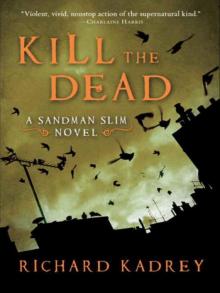 Kill the Dead
Kill the Dead The Grand Dark
The Grand Dark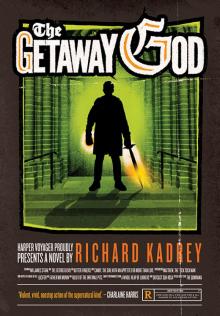 The Getaway God
The Getaway God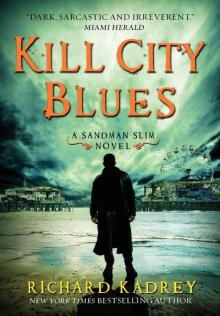 Kill City Blues
Kill City Blues The Everything Box
The Everything Box Aloha from Hell
Aloha from Hell Devil Said Bang
Devil Said Bang Killing Pretty
Killing Pretty Across the Dark Water
Across the Dark Water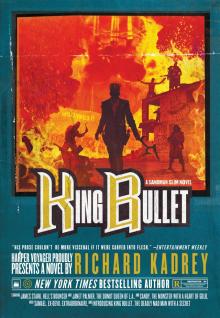 King Bullet
King Bullet Ballistic Kiss
Ballistic Kiss SS 04: Devil Said Bang: A Sandman Slim Novel
SS 04: Devil Said Bang: A Sandman Slim Novel Devil Said Bang (Sandman Slim)
Devil Said Bang (Sandman Slim) Aloha from Hell (Sandman Slim)
Aloha from Hell (Sandman Slim)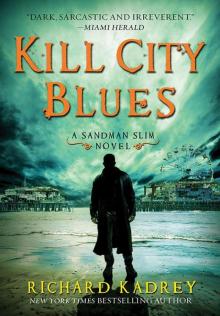 Kill City Blues: A Sandman Slim Novel
Kill City Blues: A Sandman Slim Novel Devil Said Bang ss-4
Devil Said Bang ss-4 Collected Short Stories
Collected Short Stories Blind Shrike
Blind Shrike Devil in the Dollhouse: A Sandman Slim Story
Devil in the Dollhouse: A Sandman Slim Story Devil in the Dollhouse (sandman slim)
Devil in the Dollhouse (sandman slim) Dead Set: A Novel
Dead Set: A Novel